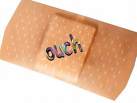

"Burke in takeover cross hairs: State verges on taking control from district," by Diette Courrege, The Post and Courier, July 13, 2006 AND
"Equality: A difficult lesson," by Steve Reeves, The Post and Courier, January 10, 2005
As a teacher I should have learned long ago never to take anything for granted. Silly me, I thought that, while I was living elsewhere in the late 1960s, the Charleston County School District had been desegregated! And, in fact, in January of 2005, the Newsless Courier ran an article about the 50th anniversity of Brown v. Board of Education "that outlawed segregation in public schools" and mentioned City Councilman Wendell Gilliard's transferring in 1969 from formerly "all-black Burke" to "all-white Rivers High."
Was Gilliard being facetious when he said, "Even today, you go into public schools and look around, you see that we still have a long way to go"? Yes, Mr. Gilliard, we've gone backwards. In 1969 Rivers still had some white students.
Since they were sitting in all-black classrooms, what went through the minds of students at Burke High School and Rivers Middle School on that January 2005 day when, exactly at the time the ruling was handed down, "the landmark court decision was read aloud by local schoolchildren"?
Part of the article mentioned interviews with those who "never got the opportunity to attend a desegregated school." Do you think the reporter saw the irony of his words? Probably not.
Today's article on Burke continues the dismal record of the CCSD and probably did not surprise anyone who has been paying attention. Courrege writes,
The trigger for Burke . . . was that the school failed to act on improvement recommendations from an External Review Team.
Teams visited 56 schools statewide, including nine locally, that rated unsatisfactory within the past two years. The team assessing Burke found that the same problems cited in December 2005 still were ignored in May of [2006]. It was the only school where that happened [italics mine].
Goodloe-Johnson, the CCSD Superintendent, points out that the school has had six principals in the last seven years, and she posits that the NEW and seventh principal will fix its problems. No one envies him his job.
Marvin Stewart, of the District 20 constituent school board (yes, the same one who made all the fuss about Buist) "attributed the school's failure to years of neglect from the county school board and previous superintendents as well as inadequate resources and a lack of parent involvement."
Yes, and I'll bet the neglect dates to when Burke became a majority black school. Goodloe-Johnson calls it "high-minority," the understatement of the article! As far as I could determine, Burke has had no more than 1 or 2 white students in the ENTIRE school per year in the last five years. Same goes for Rivers. These ARE segregated schools.As the earlier article states, equality IS a difficult lesson. Goodloe-Johnson is confident all can be "fixed" when she meets with the State Board in August. She may be correct, since Tennenbaum is the lame duck State Supertendent (she who thinks that Wisconsin requires only 13 credits for a high school diploma).
You would think that a black superintendent would take the problems faced by Burke and Rivers more seriously. On second thought, I guess not when she's a liberal bureaucrat.
Maybe being the first individual school in South Carolina to be declared in "a state of emergency" is just what IS needed. That's assuming that in November a Republican wins as State Superintendent, of course.
 Looks like this year's race for state superintendent of education is between tweedle-dee-dum and tweedle-dee-dee.
Looks like this year's race for state superintendent of education is between tweedle-dee-dum and tweedle-dee-dee.












